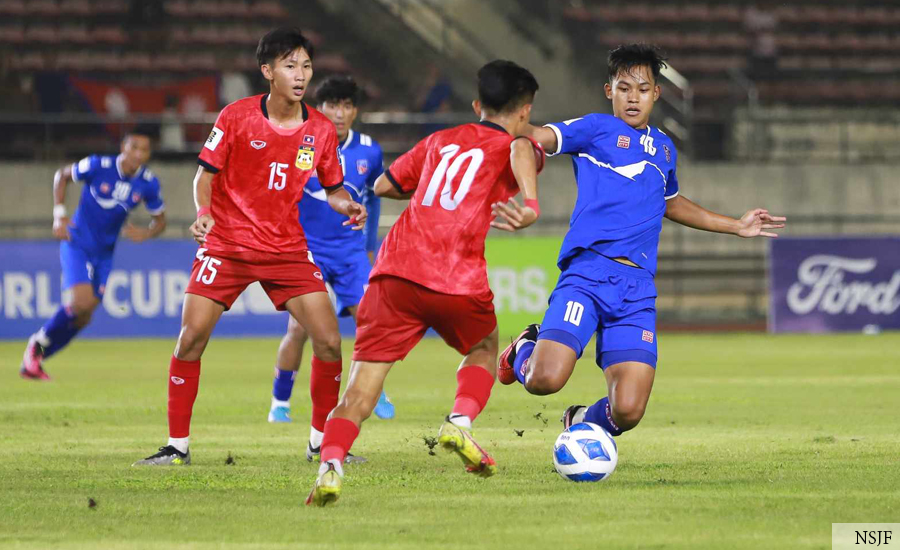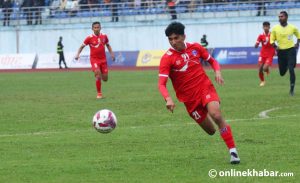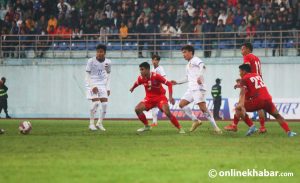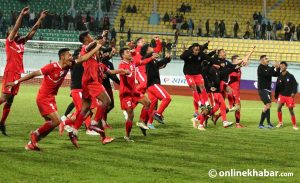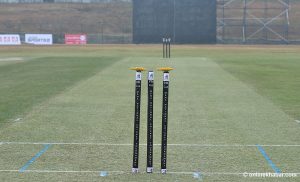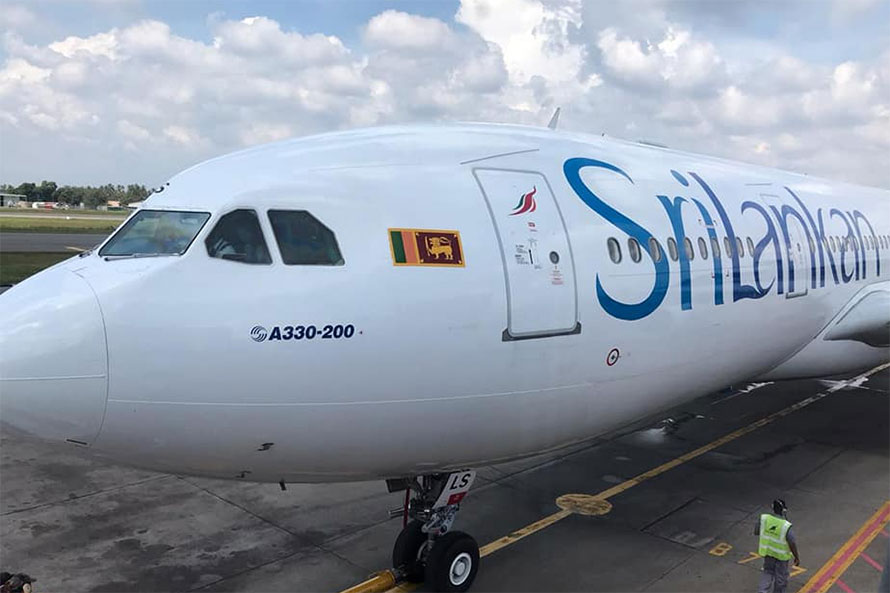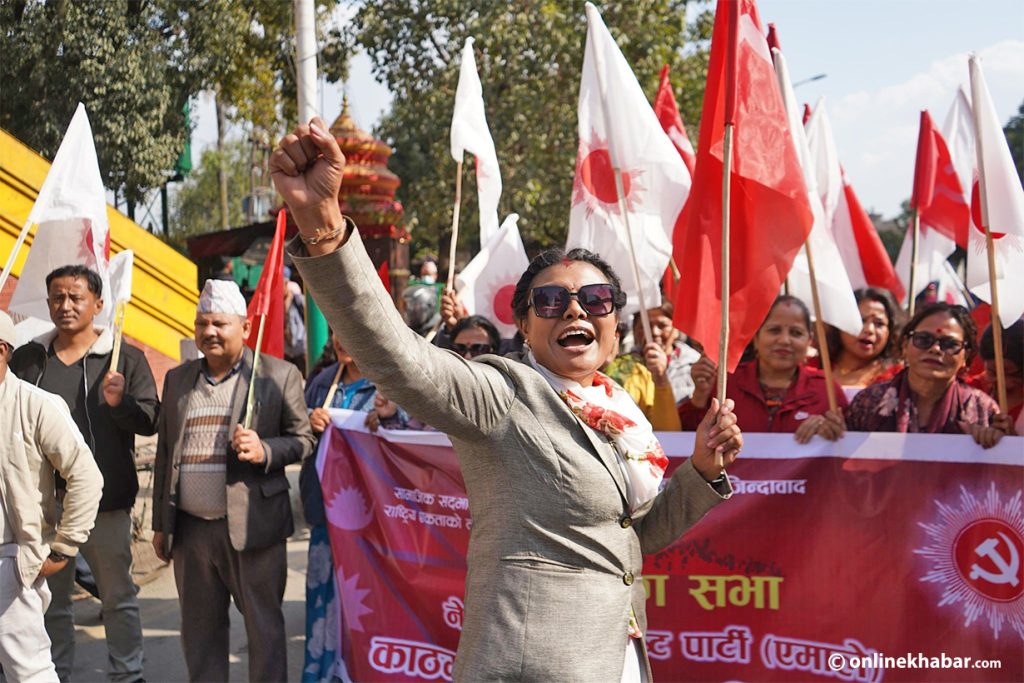
An almost-packed Dasharath Stadium was in anticipation of something special. Every time a Nepal footballer touched the ball, all 9,000 people were on their feet hoping for a moment of magic. Nepal had dominated the entire second half of the game, yet at 1-1, Laos were still in the game.
Then came the moment the fans were waiting for. Manish Dangi, who had been Nepal’s best player, took over the game. Receiving the ball in the right flank, he took a touch, ran into the box and put the ball in the net to give Nepal the lead in the Prime Ministers’ Three Nations Cup final.
The crowd erupted. All of them were there to see Nepal win. And win they did thanks to the 87th-minute strike by Dangi who, since his debut, has shown signs he can be the next best thing in Nepal football.
But a week ago, when the competition began, things looked a bit different. The team looked, lost, disjointed and in search of an identity. Even though Nepal were playing against Bhutan and Laos, both teams ranked lower than them, people were not sure if Nepal were the favourites going into the tournament. This was no surprise as the team were in transition.
But the Nepal football team clinching the recent title has suggested something different can be expected in the near future under the new coach Vincenzo Alberto Annese.
Chemistry crisis

In their first match against Laos on March 22, Nepal footballers showed in them a lack of chemistry.
The team had only come together under the new coach Annese three days before the match. That was evident as the team played with no control. The midfield looked weak as they rarely kept possession of the ball. Both Nabin Lama and Arik Bista were poor with the ball and Pujan Uperkoti was too deep to do anything.
Things were similar in the game against Bhutan where Nepal footballers struggled to keep hold of the ball in the first half. The fans were frustrated to see that there were no progressive passes. As in the first game, Lama and Bista struggled as did Uperkoti who even picked up a yellow, missing the final in the process.
The midfield struggling meant the forwards struggled too. In the first game, Nepal played Bharat Khawas and Ayush Ghalan on the wings and Nawayug Shrestha through the middle. All three struggled to keep hold of the ball and move it. Their off-the-ball movement was not great either, which meant shots were a rarity during the game. Nepal won, but that was thanks to a set piece and a wonder goal by Shrestha.
Against Bhutan, the Nepal football forwards did not get any quality service. Ghalan and Shrestha were supported by Anjan Bista, but with the midfield not playing enough progressive passes, it was a frustrating outing for the trio
Defending the goals

One shining light in Nepal football before the final was Nepal’s defence. Ananta Tamang, Rohit Chand, Bikash Khawas and Sanish Shrestha were solid in all the games. In the first game, they did not give Laos a sniff at goal and did not make many mistakes. The team played very deep, which means the defensive line was under pressure but all four were calm. Shrestha, who made his national team debut, was impressive as he was not phased by the occasion. Khawas did give the ball away a little too much, but for a back like that had not played together, this was a good enough showing.
Against Bhutan, things were different. The team were not ready for the intensity Bhutan brought to the table. That resulted in the defensive line making multiple mistakes as Bhutan scored from a corner which could have been dealt with better. Tamang and Chand were lackadaisical along with Khawas.
The second half of the game was a lot better for Nepal footballers as they took control of the game. But it was a late strike from in-form striker Dipak Raj Singh Thakuri that saved Nepal from losing against Bhutan for the first time in history.
Sea change

The Nepal football team not winning the Bhutan match comprehensively has a lot of reasons. One is a change in coach and ideology. Another is players leaving for Australia. What also did not help is the players not being able to come to terms with one another.
As Annese mentioned in his press conferences, the team over time did play better. While they resorted to playing long balls and not keeping possession in the first game against Laos, they improved against Bhutan and in the final against Laos.
With the midfield playing well, the attackers started to show promise too. Take the game against Bhutan for example. With the introduction of Kamal Thapa and a more attacking approach, the game changed. He brought energy and positive passing to the team which did not directly result in a goal, but it gave the team and the fans the belief that something would happen. Thanks to a Thakuri, it did.
Mani Kumar Lama playing his second game for Nepal was very impressive. His calmness in midfield and ability to play the ball forward was a breath of fresh air. His gameplay and ability to involve his teammates in midfield was a key reason Nepal footballers were able to control the game in the final.
Out with the old, in with the new

Nepal won the final thanks to goals from two young stars: Ayush Ghalan and Manish Dangi. Ghalan was even announced as the most valuable player of the tournament and rightfully so. He played all three games and was Nepal’s stand-out performer. Even when nothing was going right for Nepal against Laos in the first game and against Bhutan, Ghalan continued to push the team forward with his solo runs. But each time he went forward, he did not have anyone to pass to. Ghalan scoring in the final was justice for his overall impressive display in the tournament.

Dangi also showed why former Nepal football coach Abdullah Al Muatiri spoke so highly of him. He was one of the few players in the team who showed moments of brilliance. In the final, particularly in the second half, he was magnificent as his runs created chances for both himself and his teammates. Him scoring the goal to win Nepal the cup was only fair.
New culture

Al Mutairi’s time as Nepal’s coach came to an abrupt end due to his dispute with the players. Replacing him, the All Nepal Football Association appointed Annese as the coach.
Like Al Mutairi, Annese wants to play a progressive game and has gone with a 4-3-3 formation in all three games. When chasing the game against Bhutan, he was not shy to change the formation to a 4-4-2 to take the game to the opponent. He went with a similar formation when drawing 1-1 with Laos in the final.
A coach willing to make changes when necessary is a good thing moving forwards as the team will now play their next game during the SAFF Championship in Bengaluru on June 21. He knows how much the tournament means for the country, but with most of the players playing in the league, he understands the players are going to be fatigued.
But for now, things are looking good for him. He has not lost a game and has set up a good culture within the team. How long can the team go under him is anyone’s guess, but if a team that were put together three days before a tournament can do this well, giving the coach time can only make it better.






